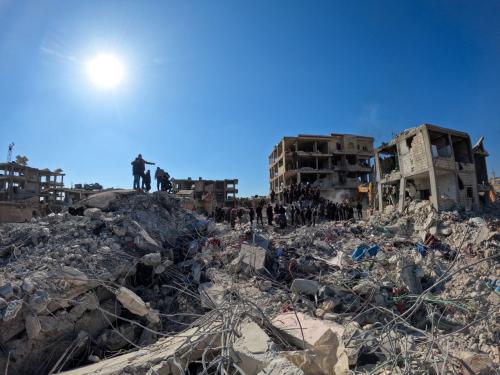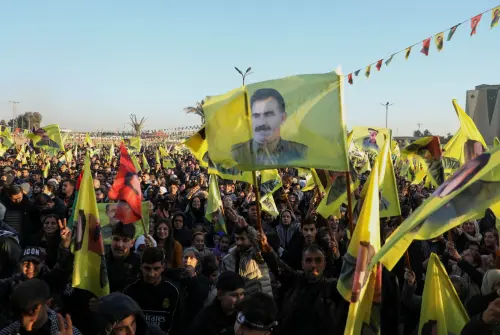The Syrian civil war is a regional conflict, and thus “needs a regional solution,” said Senior Fellow Tamara Wittes, director of the Center for Middle East Policy at a Brookings event this week. Whatever the strategy, she said,
we need to convene a regional security dialogue that’s not driven by outside actors, but that is driven by the interests of those in the region and that reckons very frankly with these questions of sectarian identity, with the role of political Islam, and with forging from the ground up, the necessary consensus for Syria’s future that will really end this war and squeeze ISIS [Islamic State], which is what [President Obama] said he wants to do.
Her remarks came during an event that featured the presentation of three strategies from a panel of Brookings experts: Michael O’Hanlon, Ken Pollack, and Dan Byman. Will McCants, fellow and director of the Project on U.S. relations with the Islamic World, also participated in the event and described how the Islamic State factors into this regional crisis.
O’Hanlon: Divide Syria into autonomous confederation zones
O’Hanlon, senior fellow and co-director of the Center for 21st Century Security and Intelligence, explained that “it makes the most sense to try to help create autonomous zones of governance and also work within these autonomous zones to build up security forces that can act as opposition to ISIL [Islamic State] and [Syrian President] Assad. This then becomes not only a political vision for the country’s future, but a road map for how to we work more closely with the Syrian opposition.” Watch:
Pollack: Intervene in the civil war
Pollack said that “Everybody seems to believe that you can’t intervene in somebody else’s civil war and actually do anything useful. That’s just wrong, it’s simply not historically accurate.” He outlined three basic steps—(1) create a military stalemate; (2) forge a power-sharing agreement among all of the different communities; and (3) have long-term commitments that the agreement includes guarantees for minorities and will endure.” Watch the video for specifics of this outline as they apply to Syria:
Pollack also emphasized a key point about the Islamic State (which he calls Daesh, a term used by some western officials) made throughout the program by other panelists, namely that:
one of the biggest problems we have is that this administration has decided to focus on Daesh—as if that’s something that you could actually do—in absence of dealing with the Iraqi and Syrian civil wars. And what all of us are starting with the implicit recognition of is that’s simply not possible. It is not possible to focus on Daesh absent the wider problems of the Iraqi and Syrian civil wars. And it’s why this administration’s whole approach is self-defeating and nonsensical.
Byman: Contain the instability in Syria
Byman, a senior fellow and research director of the Center for Middle East Policy, plus a professor at Georgetown University’s Security Studies Program, made it clear that he didn’t mean “containment of the Islamic State … but really containment of the instability of Syria.” He argued that the conflict in Syria must be prevented from spreading further into Iraq, and into Lebanon, Jordan, Turkey, and elsewhere. Byman outlined a strategy that addresses the refugee situation, border security, counterterrorism assistance, and weakening the Islamic State. Watch:
Wittes noted that while the Obama administration has articulated four approaches to Middle East policy during its tenure, each “has foundered on the realities of a disordered region in which not only our adversaries but also our allies and partners have simply not been on board with the president’s approach.” She outlined the sources of a “vast gap in understanding and in preferences between the United States” and regional actors, which include: the sectarian conflict, the role of Islam in politics, and the nature of and response to the ISIS threat. For the regional actors, Wittes said:
Syria is central. It is an arena—in fact in many ways it has become the arena—for all of the conflicts that are
raging across the Middle East. We have a Middle East that is undergoing historically
unprecedented change. We have a breakdown of states; we have a breakdown of the
state system. And in the midst of that breaking down, we have multiple conflicts being
waged across the region. All of them are present in Syria and create a very complex picture.
McCants, author of a recent Brookings Essay on the origins of Islamic State leader Abu Bakr al-Baghdadi, and author of “The ISIS Apocalypse: The History, Strategy, and Doomsday Vision of the Islamic State” described how the Islamic State factors into this regional crisis. He reviewed how the Islamic State emerged and operated since its founding in 2006, but noted that “something has changed in the last two weeks. It has all of a sudden decided to devote resources to carrying out attacks on its primary enemies.”
Watch the full event video or read the transcript here to get all of the panelists’ remarks.
The Brookings Institution is committed to quality, independence, and impact.
We are supported by a diverse array of funders. In line with our values and policies, each Brookings publication represents the sole views of its author(s).




Commentary
3 strategies to address the Syrian civil war
November 20, 2015